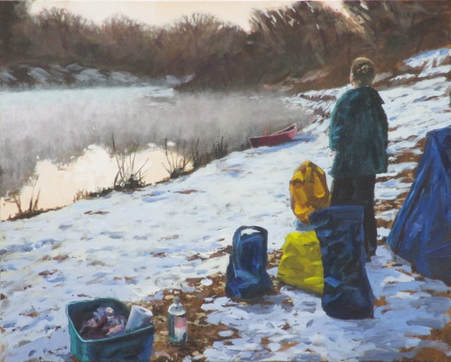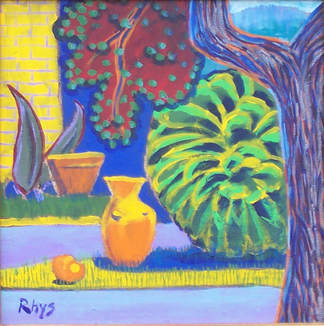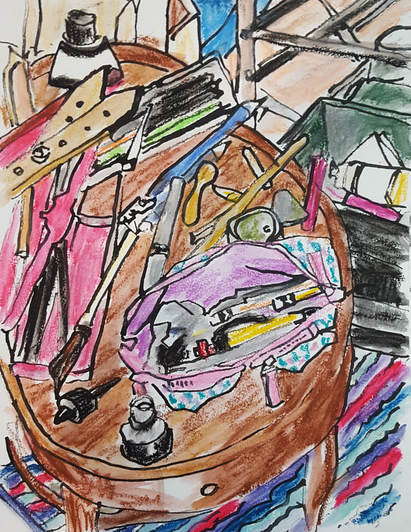 Last Day on the Suwannee, one of the first secret paintings
Last Day on the Suwannee, one of the first secret paintings Roberta Murray asked the question, “What would I paint if I knew nobody was going to see it?” I thought this was an excellent question because it suggested an approach to the question “Who am I? What am I trying to do? Why am I painting?”
I was stimulated to enact that very circumstance. I kept all my paintings secret for quite a while, and avoided critiques and comments. I did see my work going in a particular direction, and eventually had the focus to let my productions go public again.
But we always evolve. We peel another skin off the onion and discover that our concerns are still more basic, still more central.
I find no convincing reason for why we paint. There are causes, but not reasons.
Human beings are driven to control their environment. There is no explanation for this; it's just the way humans are put together. Visual artists seek to provide stuff to look at, even if only for themselves. Freud was wrong when he said that artists are primarily seeking fame and sexual conquests. It is true that we wish for that and it may be a factor in any field of endeavor, but art is motivated by the drive to make art.
I was stimulated to enact that very circumstance. I kept all my paintings secret for quite a while, and avoided critiques and comments. I did see my work going in a particular direction, and eventually had the focus to let my productions go public again.
But we always evolve. We peel another skin off the onion and discover that our concerns are still more basic, still more central.
I find no convincing reason for why we paint. There are causes, but not reasons.
Human beings are driven to control their environment. There is no explanation for this; it's just the way humans are put together. Visual artists seek to provide stuff to look at, even if only for themselves. Freud was wrong when he said that artists are primarily seeking fame and sexual conquests. It is true that we wish for that and it may be a factor in any field of endeavor, but art is motivated by the drive to make art.
 Ed's Driveway, painted a couple of years ago but only very recently displayed
Ed's Driveway, painted a couple of years ago but only very recently displayed However, it is difficult, if not impossible, for an adult to undertake the making of art and ignore considerations of acceptance. We crave the praise of others, especially if it is necessary for us to sell our works to make a living. That’s a primal urge as well, but making art for money or applause corrupts and distorts that underlying drive to "make marks."
There is a type of human being that is able to make art free of the craving for riches and fame. An innocent child young enough to have never been burdened with concerns for worldly success will exhibit instinctive action in its purest form. Picture a toddler playing with blocks. Before the pursuit of praise distorts her* motivations, she happily puts blocks together with no concern but her own actions and her enjoyment of them.
Children at the beach make sandcastles with no expectation of praise, sex, or money.
An artist who puts on the mantle of the young child and imagines herself “building sandcastles” as she paints relinquishes the side benefits of her actions. She taps the well of pure creativity.
It is in this frame of mind that I create the works in the Sandcastle Series. I make no claim for their excellence or even competence. Those considerations are irrelevant. I am doing nothing more sophisticated than following my primitive artistic impulses.
There is a type of human being that is able to make art free of the craving for riches and fame. An innocent child young enough to have never been burdened with concerns for worldly success will exhibit instinctive action in its purest form. Picture a toddler playing with blocks. Before the pursuit of praise distorts her* motivations, she happily puts blocks together with no concern but her own actions and her enjoyment of them.
Children at the beach make sandcastles with no expectation of praise, sex, or money.
An artist who puts on the mantle of the young child and imagines herself “building sandcastles” as she paints relinquishes the side benefits of her actions. She taps the well of pure creativity.
It is in this frame of mind that I create the works in the Sandcastle Series. I make no claim for their excellence or even competence. Those considerations are irrelevant. I am doing nothing more sophisticated than following my primitive artistic impulses.
 Drawing Materials on a Chair, recently created, recently shared online
Drawing Materials on a Chair, recently created, recently shared online I do not consider this practice to represent fully evolved art-making. Experience, virtuosity and knowledge must play a part in a completed work of art, but I have come to believe that frequent experiences and insights provided by “sandcastling” are an essential part of an artistic career.
I am publishing the Sandcastle works not because they are delightful, but as a consequence of my commitment to them. It is not necessary for anyone to like them to satisfy me. Just as a child will build a sandcastle on the beach oblivious to adults and other children walking by, I am in a state of disengagement with the public world of art as I create these works and allow others to see them. If they are beautiful or charming, I am happy for it but that is not my intent.
If you as viewer enjoy seeing another person working and having a good time, that's all that I can reasonably expect.
*A repost of a footnote in June 2016
My solution to the indeterminate gender pronoun controversy is to default to the feminine. This is to signify that I have always viewed the use of “he” as implying nothing about gender politics, and choose now to view “she” in the same way. Since it does matter to some people, the truly even-minded writer should have no problem accommodating them. Those who cannot let go of the masculine bias really have no justification for it.
I find that the sprinkling of both gendered pronouns, supposedly equally throughout, shouts endorsement of gender politics—and what good does that do? In the same vein, I deplore the use of x, as in xe for s/he or any other solution that does not just graciously acknowledge that 2500 years of male dominance of pronouns is enough, and if we really believe it didn’t matter, it still shouldn’t.
You know what would be a truly lovely, loving solution? What if male writers used “she” exclusively and female writers used “he”?
My solution to the indeterminate gender pronoun controversy is to default to the feminine. This is to signify that I have always viewed the use of “he” as implying nothing about gender politics, and choose now to view “she” in the same way. Since it does matter to some people, the truly even-minded writer should have no problem accommodating them. Those who cannot let go of the masculine bias really have no justification for it.
I find that the sprinkling of both gendered pronouns, supposedly equally throughout, shouts endorsement of gender politics—and what good does that do? In the same vein, I deplore the use of x, as in xe for s/he or any other solution that does not just graciously acknowledge that 2500 years of male dominance of pronouns is enough, and if we really believe it didn’t matter, it still shouldn’t.
You know what would be a truly lovely, loving solution? What if male writers used “she” exclusively and female writers used “he”?
 RSS Feed
RSS Feed